
Finally, after months of anticipation, rumor, gossip and innuendo, it has happened: Joe Bell arrives in theatres July 23.
The movie originally premiered at the Toronto International Film Festival last year, where it earned praise for its leading performances by Mark Wahlberg, Connie Britton and–in particular–Reid Miller. Based on a true story, Joe Bell follows the titular grieving father (Wahlberg) on a walking trip across the United States to awareness of bullying. With him is his son Jadin (Miller), by turns giving him words of encouragement and ridicule. Flashbacks provide context to their contentious relationship: Jadin came out as gay in high school, which became a source of embarrassment for Joe and Jadin’s mother, Lola. A tragedy shatters the family and prompts Joe to walk across the country to redeem himself in the eyes of Jadin. Redemption, however, does not come easy.
Joe Bell marks the second feature of director Reinaldo Marcus Green. He first arrived on the film scene in 2018 with his film Monsters and Men, which won the Best First Feature prize at the Sundance Film Festival. Originally hailing from Staten Island, New York, he earned wide praise in both Monsters and Men as well as Joe Bell for his exploration of masculine identity, and for humanizing stories overblown in media blitz.
Joe Bell underwent a title change and shuffling of distributors following TIFF 2020 due to the COVID-19 pandemic. We caught up with director Green at the festival, and are delighted to finally share our interview with him just ahead of the movie’s long-awaited release. Joe Bell arrives in theatres July 23.
How about we take this to the next level?
Our newsletter is like a refreshing cocktail (or mocktail) of LGBTQ+ entertainment and pop culture, served up with a side of eye-candy.
What’s your festival experience been like with all this virtual craziness?
Unfortunately this year many of us were unable to attend the festival. Toronto has an incredible reach. They’ve done a great job giving folks every opportunity to see films online and in drive-in theatres. They’re getting innovative as they possibly could. I’ve heard positive things from the folks that were able to see films in theatres. So it’s been great from afar.

This is your second feature. How do you go from a gritty urban drama to a story of a guy walking across the country?
[Laughter]
It felt gritty to me. I’ve always wanted to take a lot of road trips, so a road trip movie? Look, I got an email that said “Script by Larry McMurtry and Diana Ossana.” So, like a kid in a candy store, as a filmmaker, you rip those packages open. So I did. I read it. I had an emotional reaction. I didn’t know what the process was or where they were, but Mark Wahlberg was already attached. Part of the process was getting the room with Mark.
Sure.
I was living in Italy at the time, and I flew from Italy to Boston. It was a crazy trip. It was a one-hour meeting. I met Mark in some dark room somewhere, and by the end of the conversation, he told his assistant to give me his number. I was like wait, did I get the job?
[Laughter]
I didn’t know. It unlocked this whole new chapter in Hollywood. In that conversation with Mark, as any director, you’re looking for the truth. He felt truly invested in the role and the complexities of the character. Whatever drew him to the story was real. He was going to give the devotion to it. It was amazing to hear as a young director how passionate he was about the story. So to hear that from your lead actor—it’s not always that common that you’ll have three or four months rehearsal with someone. It’s very rare.
Right.
Mark was like, we ain’t putting fake beards on me. We’re growing it out. I’m losing weight. It was clearly something he was taking very seriously. I think Joe’s character—Mark really responded to him, and he didn’t want to shy away from some of the things he does in the film. He wanted to embrace and amplify them. [We both felt it was] important not to sugarcoat. We wanted it real. So that was an amazing meeting for me: to look in my lead actor’s eyes and know I would have a collaborator and someone to give their heart to the story. When you start from a place of love, in my mind, you can only do right. So that was a great starting point.

Few names among writers tower in Hollywood, but Larry McMurtry and Diana Ossana do. What kind of communication did you have with Larry and Diana?
To be completely honest, I didn’t have much contact with them. It wasn’t because I didn’t want to, it just didn’t come about. The script had been around for a few years. Cary Fukunaga, who is a producer on the film, had developed the script with Larry and Diana. I think it was three or four years of development.
Oh wow.
They had collectively interviewed everyone in the family and all their friends. They had done a tremendous amount of research before I got it. When I received the script, Cary had gone on to do [No Time to Die]. So I was coming in to help shape it a bit. It was a great script, but it was long. We needed to shave it down to make it, otherwise we’d never be able to shoot or budget it. So it was really cutting a lot of the tapestry—landscapes and things we’d never be able to shoot. If I’d have had seven months to shoot Into the Wild like Sean Penn, I could do those scenes. So it was painful to cut anything from a Larry & Diana script, but hopefully, we cut the beauty shots. We didn’t want to make a travelogue, but we wanted to go on the journey. And it was full steam ahead when I came on the project.
I have to ask, is it intimidating to work from a script from such respected writers?
A little bit, yes. The absolute thought was do I really want to come from behind a movie like Brokeback Mountain, which is perfect? That’s a recipe for disaster.
But then, why not? My whole life has been facing fears. So I felt like I was tackling my own fear in that way. Going back to my younger years, I was a semi-professional athlete, a pitcher. And it’s the most nerve-wracking position, and to win the game, you can’t go out there and be nervous. So I kind of conditioned myself to take on difficult challenges like the challenge of this movie. I also wanted to say it’s not Brokeback Mountain. It’s my movie. That movie is a masterpiece, but we’re making our own film which will hopefully touch hearts in minds in our own way.
There is a specific scene I want to ask you about, one of the most delicate in the film. Jaiden calls his best friend just prior to his trip to the park. It’s a cry for help. Reid Miller is excellent in conveying that desperation. How do you go about directing an actor that young to get to that kind of emotional bottom?
You know, sometimes there are magic moments that happen on a film set. If you remember in that scene, he’s standing in an alleyway. And the light was incredible. It was as if it was writing it with us. The light dictated the scene that day. Reid is an incredible actor, so he had that vulnerability. Sometimes it’s on the first take, sometimes it’s take six. And this was take six: one of those times I knew there was more in the tank. So when I didn’t call cut, he knew he had to dig deeper. And a good actor knows that.
Of course.
Those are real tears. I don’t know what he’s thinking about, but he’s tapping into something. He’s become Jadin. And it’s not the tears per se; it’s the release. And Reid smashed the movie. That scene was incredible to see him let go. It was beautiful to watch. It’s heartbreaking.
He is wonderful, and I would add: I know a lot of queer people who have had that moment, especially a lot of young gay boys. It’s powerful to watch.

Joe, on the other hand, is such a frustrating character. He desperately loves his family, including his son Jadin, but doesn’t know how to communicate that. Do you see that as a flaw specific to his character, or is that part of a larger issue with his view of masculinity?
I think it’s a combination of both. It’s definitely his character, and it was something we embraced. Joe had a hard time articulating his feelings. What he wanted for his son may not have been what Jaiden needed. We all need somebody to open our eyes sometime. I hope Joe’s point of view helps other people see that in themselves. In society, there are a lot of people who are complicit and don’t know it—they don’t know they are part of the problem. A lot of folks want to do good, they just don’t know how to do it.
Very true.
There are a lot of Joe Bells in the world that can relate to this, a lot of families. I think the more we can get ahead of the situation, the more we can avoid tragedies. I hope the film positions itself that way, to be part of the solution.
Well said. When you’re dealing with a character like that who is potentially so alienating, and who does not know how to show vulnerability, how do you open him up in a way so he’s accessible to an audience?
I think Mark is naturally relatable. That’s part of who he is. I think the casting of Mark is a really strong choice because he relates to the Joe Bells of America, and that’s a lot of who his audience is. I think what’s important is that we don’t take that for granted in the film. We don’t let him off the hook. We show complexity. We show anger. We show love. We show the levels of a human being, which makes Mark’s performance so much more important. I think we have to understand that part of the story to move forward, and who better than Mark Wahlberg to get us there? I think he did an incredible job, and Larry & Diana set him up in such a way that they don’t let him off the hook. That gives audiences a way in, and in some ways, a way out.
You’ve said that becoming a dad yourself offered you a way into the material. How does becoming a father change your approach to the material? The kinds of projects you’re attracted to?
That’s a good question. I’ve always been attracted to universal, human stories my whole career. I hope my body of work speaks that way. It’s not new, but [being a dad] makes it all the more important. I want my kids to be proud of all the things dad has worked on in his life. I don’t want them to say “Why did he do that movie? He must have needed to pay off a student loan…”
[Laughter]
I don’t want it to ever feel like that. I want it to be my truth and experience. This story came to me for a reason. I don’t know why. And I don’t question that too much. When I got the email, I knew I could walk away, or I could embrace a story that is so heartbreaking and heartwarming in some ways. It broke my heart, but I knew it could help the Jaiden’s of the world. That was the feeling. And that was enough for me to say yes, and something that, as a father, I can be proud of 10, 15, 20, years from now. If I’m still kicking around, I’ll be proud of the movie.

I have to confess I’ve not seen Monsters and Men, but from what I can tell, it’s another story about men deeply conflicted over societal constructs and attitudes, their own feelings, and how to make the correct choice. What attracts you to stories and characters like that?
Well, Monsters and Men was a very personal story. I grew up in Staten Island. My father worked for the Department of Investigations. What you see in the movie is a lot of what I was grappling with. It was set in my backyard, so to speak. But again, it is a film that deals in gray. It’s complicated. It tries not to point fingers, but it tries to understand. It asks questions. And I think in asking questions, it allows us to take action. The films have similar themes in that way: they are trying to get people to understand and have empathy and take action. Film has the power to do that, so I’m using my platform to bring those stories to life. Hopefully, I’ve done that with my first two.
Joe Bell arrives in theatres July 23.


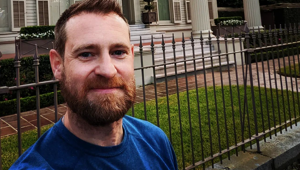
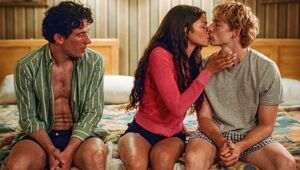




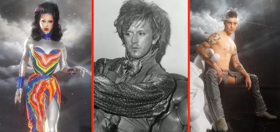


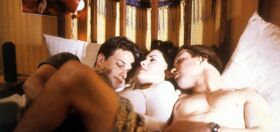






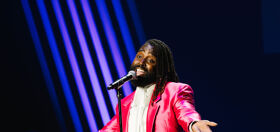
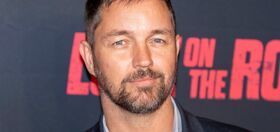
WashDrySpin
Another kill your gays movie…NO THANK YOU!!!
Hdtex
^^Being this stupid should be painful ^^^
WashDrySpin
Another “Bury Your Gays” movie…NO THANK YOU!!!
This is what Hollywood does…present a gay character that people want to and need to relate to because they are DEAD…not because they are living their authentic lives with their families accepting them and EVERYONE growing…it is so depressing and it has been done SO many times!
His dad NOW in death finding the courage to do better…
Gay people can not be allowed to live in these movies…this trend NEEDS to stop…
lykeitiz
First of all, it’s based on a true story, so it’s not a Hollywood creation. Secondly, I hate to break it to you, but homophobia is alive and well. I’m not a fan of Mark Wahlberg at all, but like the article stated, the director points out that his audience might be the ones who need to hear this story. Personally, I think the trailer looks interesting & I’d like to check it out. There’s room for MANY types of gay stories, so why don’t you go make the kind you’d like to see?
WashDrySpin
How many of these movies/TV shows will they make about gays committing suicide
Prayers for Bobby based on a true story
Boy Erased based on a true story the character Cameron
Tu Me Manques
The Children Hours
Cloud Atlas
Lost and Delirious
Glee
Trevor short film
Little Miss Sunshine
The Hours
there are SO many and the more that LGTBIA people see these images there is a correlation to them possibly committing suicide as a viable option for their lives
Hdtex
You have absolutely no idea what you’re talking about.
How embarrassing.
mailliw110
In reply to your own reply(which is weird, BTW). Until they hating stops.
Terrycloth
I’ve read the reviews. I hate I know what happens. Why see it when you already know the outcome ?
WashDrySpin
it is all about the straight father and his journey to accept his dead son….
Kevan1
@Terrycloth knowing the ending and going on the journey are two different things.
Heywood Jablowme
Spoiler alert: the Titanic sinks!
Seth
Hard pass.
Casting Mark Wahlberg makes this unwatchable.
WashDrySpin
When I see Mark embracing his gay child or friend like Josh Duhamel did in Love Victor then I am there
Heywood Jablowme
“I met Mark in some dark room somewhere,”
A lot of guys can say that, lol.
Hank31
If the trailer is accurate, then this is not a movie about a father and a gay son. It’ s about a father and an extremely effeminate son. The boy is a cheerleader, and is barely distinguishable from a girl in appearance and mannerisms. Very off-putting. There’s no indication in the trailer that the boy’s sexual orientation, i.e., his attraction to males, was an issue. The characters simply use “gay” as a way to refer to the boy’s gender problems. Rather offensive.
Also, has Wahlberg ever made restitution to the Vietnamese men he violently assaulted as a young man? If not, there’s an ethical issue in promoting or going to his films.
Man About Town
The problem with the above assertion that there aren’t enough movies that show gay people “living their authentic lives with their families accepting them and EVERYONE growing…” is that’s a boring pitch for a scenario, it isn’t marketable, and no one will buy it because, as perceived, hardly anyone will go see it.